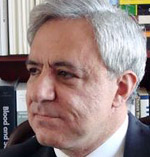– Did the US state secretary Hillary Clinton want to show with her announcements during the meetings with the Armenian, Azeri and Turkish foreign ministers that her country is pressing on the processes of developing relations between Armenia and Turkey and the settlement of Karabakh conflict?
– It is natural and logical that the West and the international community really would like to see the normalization of the relations between Armenia and Turkey. Eventually it is in their interests and they will get rid of the shadow of the Armenian genocide recognition. However we should be governed by our interests. I think that there has been no pressure on the Armenian side so far, and now we can refuse to agree if the documents on the table of negotiations are out of our interests. It is a result of either pressure or wrong calculations. I think we should not sign the document in the form as it is now. If the document were better, I would be for it for sure, but now I can’t defend this document even if I want the relations normalize too much.
– What should the Armenian authorities do not to sign this document? Even now when it is impossible to change anything in it.
– Now in order to solve such big issues we should have the agreement of at least the majority of the Armenians worldwide. This is not an issue of the present times; these are historical issues and our rights. At least it will decide our role in the region and will have influence on the issue of Karabakh conflict as well. I don’t think it is the right decision to sign this document in a situation when the society is divided in two parts, the Diaspora is separated too, the relations are very hard, the economy is in a bad situation. It is clear that the majority of the Armenian people are against it. This is a wrong way; it should be the vice versa. The sides should develop relations without preconditions in order to enable both parties to enter in a dialogue and speak of the problems in transparent and free conditions. These protocols are excluding this possibility.
– Yesterday there were rumors that Georgian MPs had collected signatures to discuss the issue of the Armenian Genocide in the Georgian parliament. Despite these processes you assure that after signing the protocols the process of the Genocide recognition will stop.
– I think it is the initiative of the Armenian MPs as they want to show that despite the government’s decision and policies they will never give up on the issue of the Genocide. But I think that unfortunately the Georgian parliament will close the issue very fast by referring to the protocols to be signed between the parties. It is two years that no other parliament in the world is not only abstaining from any discussions on the issue of the genocide but refusing to adopt it as well. This is unprecedented. During the past ten years there have been discussions in at least five or six parliaments, and in one or two parliaments the issue was recognized. This process stopped during the past two years. Such attempt happened only in the Israeli parliament, which lasted ten minutes only because they referred to the talks between the two countries and said they did not want to interfere in that process. This is Turkey’s goal. The provision on establishing a commission of historians envisaged by the protocol will be used by Turkey to prevent any discussion on the issue of the Genocide
– The Armenian and Azeri presidents will meet in Kishinev on October 9. One day after this meeting the parties will sign the protocols in Switzerland. Do you think that the presidents will come to an agreement on the issue of Karabakh and then sign the protocols after it? The Turkish officials are often making announcements stating that the issue of Karabakh is connected with the issue of normalizing the relations with Turkey.
– I can’t say, but it is a fact that these two issues are interconnected. These two issues have never been so closely interconnected. The success of failure of one of these issues depends on the other. One can see this even without reading between the lines. This is said by a person who is going to open the border. Erdogan is saying this.
– You assure that Karabakh was left out of the process of negotiations not in the office of Kocharyan when you were foreign minister but earlier in 1997. During the opposition’s recent meeting Levon Ter-Petrosyan announced that the OSCE group co-chairmen, together with Armenia and Azerbaijan, presented the latest recommendations to Karabakh in 1998, which means that Karabakh was a part of the negotiation process at that time too and had a right for veto. The first president said that if Vardan Oskanyan did not understand or was trying not to understand it, it was minimum strange if not immoral. Why did not you take this fact into consideration in 1998?
– Let’s not give mutual answers. I think the facts are clear. I don’t want to discuss it too much because I have said everything about it.

